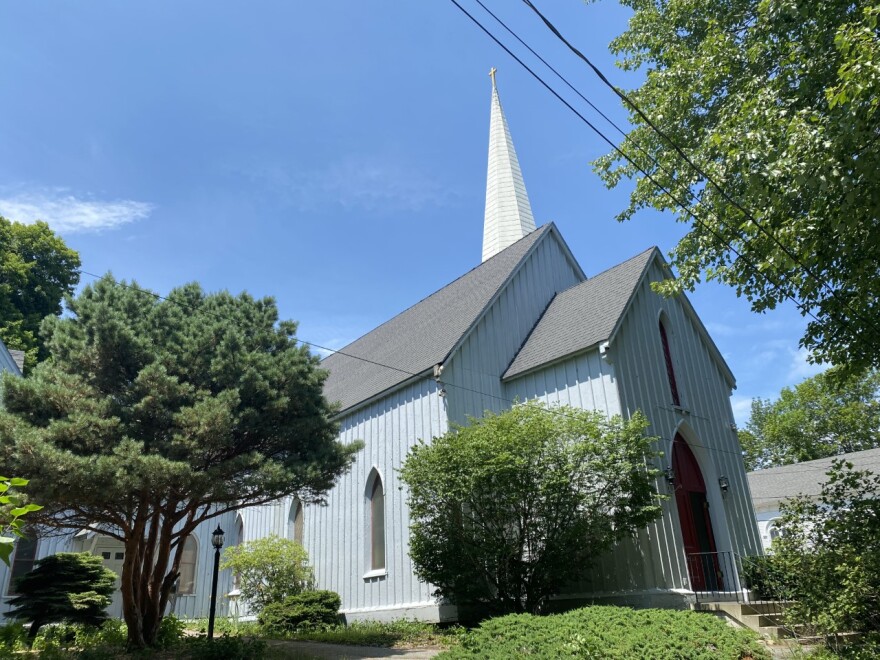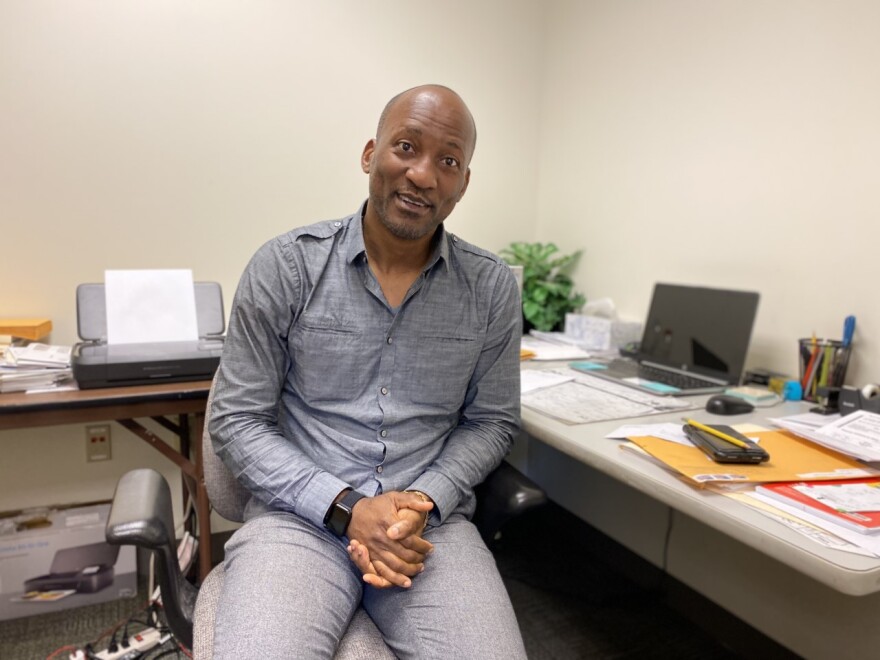It’s no secret that affordable housing can be hard to come by in Maine. Home prices are up nearly 30% compared to this time last year, according to the Maine Association of Realtors. Meanwhile, skyrocketing demand for rental units has overwhelmed an already limited housing stock.
The severe lack of affordable housing poses a particular challenge for people who arrive in Maine as refugees or asylum seekers — and it’s pushed at least one organization to come up with a unique housing solution.
On a recent morning, Efrain Ferrusca and Hussein Albraihi were busy removing a sink and cabinet from the former Episcopal Church of Saints Matthew and Barnabas in Hallowell.

They were renovating the building on behalf of the Capital Area New Mainers Project, or CANMP, a nonprofit that works primarily with Syrian and Iraqi refugee families in the Augusta area.
The church congregation dissolved last year and donated the property to CANMP, which will rent the renovated fellowship hall to a Syrian family of nine and use the church sanctuary as a community center.
CANMP co-founder Hasan Alkhafaji said it’s one step in addressing an acute shortage of affordable housing in the Augusta area.

“Because the community is growing up,” Alkhafaji said. “We have more people moved from another state, plus the immigrants who is coming from overseas, and we don’t see any new buildings around.”
It’s a challenge that Abdalrahman Riad knows all too well.
“And that was very, very hard to us to find a house and stay in a house,” Riad said.
Riad, originally from Syria, relocated to the Augusta area from Tampa, Florida, in 2019 with his mother, brothers, sisters in law, and nieces and nephews — thirteen people in all. Another family took them in while they searched for housing, fitting a total of 25 people into a six-bedroom house.
“We [were] separating us, men sleeping in the living room in the floor, women sleeping in the rooms,” Riad said.
After about six months, Riad moved into an apartment with his mother and one of his brothers. But his housing struggles continued — he got married in early July, and, with his wife ready to move in, their two-bedroom unit was starting to look pretty small, and his search for a larger place had so far been fruitless.
“We need to have like three bedrooms,” Riad said. “One for my mom, one for my brother, one for me, you know. And there is nothing.”
Riad’s housing frustrations are part of a statewide trend. A new report from the National Low Income Housing Coalition shows Maine’s affordable housing shortage has gotten worse over the past year.
In the Portland area, the rental market has become so tight that it’s made it nearly impossible to resettle refugees in the city.
“In the last few weeks, we’ve resettled four families and none of them in greater Portland because we cannot find housing,” said Hannah DeAngelis, director of refugee and immigration services at Catholic Charities of Maine, the only refugee resettlement agency in the state.
DeAngelis said Catholic Charities is preparing to find a lot more housing this year as the Biden Administration reverses the drastic cuts to refugee admissions made under former President Trump. She said it’s going to be tough, especially when new arrivals are trying to live close to family members who are already in Maine.
"It’s going to be a huge challenge,” DeAngelis said. “And so I think that we’re gonna have a lot of tough conversations with families about just what the choices are, so folks can make a choice that’s best for their family. And best for, yeah, being able to pay rent.”
While federal law assures refugees some basic assistance upon arrival, people who fall under different immigration statuses, such as asylum seekers, can often find themselves in more precarious situations.
This distinction matters a lot in Brunswick, which is home to several dozen asylum-seeking families from Angola and the Democratic Republic of the Congo.

Much of the work of finding long-term housing for the families falls to Nsiona Nguizani, who works for the town of Brunswick as a cultural broker. He said it’s hard to imagine how a single mother with three kids, for example, would be able to find an apartment in the area.
“It could be something around $1,500, $1,600 a month,” Nguizani said. “Would mom be capable to cover that? Would it be affordable? That’s the question.”
And it’s an urgent question - the state has provided housing assistance to the families since they arrived in 2019, but it’s scheduled to end in December.
Nguizani said the lack of affordable housing in Brunswick is hurting local businesses, which desperately need workers. Even as many of the local asylum seekers are now getting their work permits, it’s unclear if they’ll be able to stay in the area.

“Everybody — restaurant, business, I mean, production - everybody’s asking you for people. But I don’t have even the numbers they’re asking me!” Nguizani said.
Without a statewide push to address the issue, Nguizani said, the acute housing shortage will have impacts well beyond the communities he works with.
“We say we need people in Maine,” Nguizani said. “But people cannot come if you don’t have the housing situation.”
Up the road at the former church in Hallowell, one small-scale solution continued to take shape as Efrain Ferrusca and Hussein Albraihi succeeded in removing the cabinet and sink so the plumbers could come and do their work later in the week.
They said they hoped to have the place move-in ready by early August, when one family, at least, will be able to put the housing search behind them.
Ari Snider is a Report for America Corps Member



